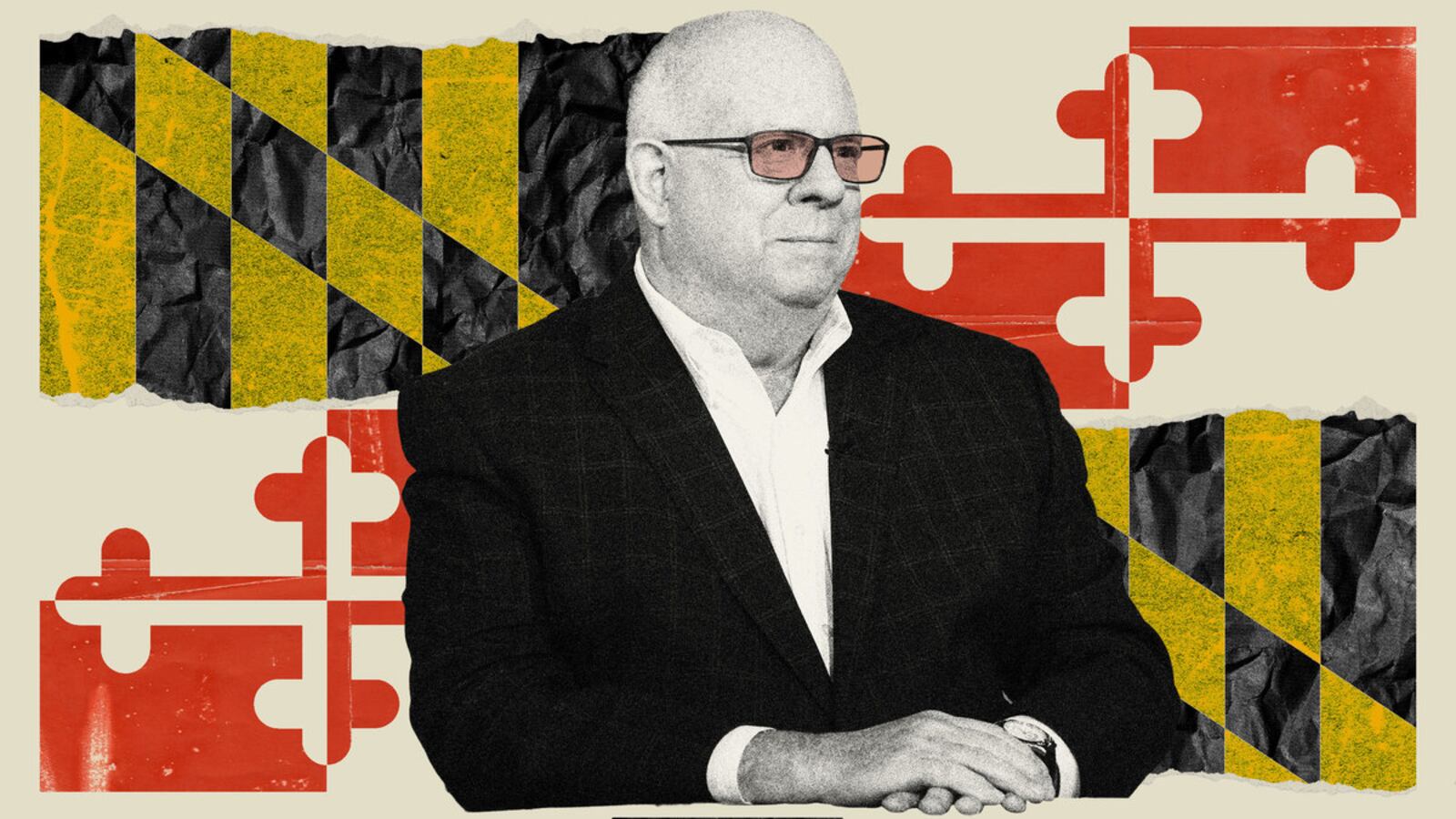The race for U.S. Senate in Maryland wasn’t supposed to be this competitive. Then again, Republicans weren’t supposed to recruit a candidate they couldn’t have designed more perfectly in a lab if they tried.
A former two-term Maryland governor, Larry Hogan has spent more than a decade cultivating his brand as the ultimate blue state Republican. His moderate record in office—and staunch criticism of former President Donald Trump—have fueled his consistently high approval ratings in the state.
When Hogan launched his bid for Maryland’s open Senate seat last month, he said he was spurred to act out of disgust over Senate Republicans tanking a bipartisan border security deal. He doesn’t ever plan to vote for Trump.
For Democrats, who cannot afford to have Maryland become an expensive and highly competitive Senate race given how many seats they are defending elsewhere this year, victory will hinge on pulling off a delicate and difficult messaging act.
They’ll need to persuade Maryland voters who know—and like—the former governor that electing him would mean empowering the GOP extremism he claims to abhor.
Already, Democrats are making the case that a Senator Hogan would give Republicans a Senate majority that would make a MAGA wish list come true, particularly when it comes to key concerns like access to abortion rights.
One of the Democratic frontrunners to take on Hogan in November, Prince George’s County Executive Angela Alsobrooks, laid out exactly how Democrats plan to link Hogan to the conservative agenda.
“This Republican Party is led by Donald Trump, and Donald Trump has promised to ban abortion nationally. He’s promised to repeal the Affordable Care Act. That is important to a lot of families in Maryland and across the country,” Alsobrooks said in an interview with The Daily Beast.
“This is the party that Governor Hogan belongs to,” Alsobrooks said. “And he will be a part of voting in a Republican caucus that will turn back rights enjoyed by so many of us, and I don’t think that Marylanders will turn the Senate over to the Republicans. So this is how we will fight against it.”

Angela Alsobrooks speaks at a campaign event in Baltimore on Oct. 23, 2023.
Amanda Andrade-Rhoades/The Washington Post via Getty ImagesIn a statement to The Daily Beast, the other frontrunner Rep. David Trone (D-MD) struck a similar tone. “We can’t afford to hand the keys to the Senate to Larry Hogan, Mitch McConnell, and Republican extremists,” he said. (His campaign declined to make him available for interview.)
While Hogan built his popularity in Maryland by focusing on less partisan issues like infrastructure and economic development, Democrats are betting that he won’t be able to escape the fact that all Senate races are heavily nationalized around Washington partisan politics.
“It’s a very binary question,” said longtime Maryland Democratic strategist Len Foxwell. “Are you going to caucus with Democrats who are in favor of a woman’s right to choose, who are in favor of getting semi-automatic assault weapons off the street, and who will support progressive Supreme Court justices? Or are you going to caucus with the Republicans who stand in opposition to those core values?”
Democrats, then, won’t be the only ones in Maryland attempting to land a delicate balancing act: Hogan will be repeatedly pressed on these flashpoint issues through November and will have to find a way to maintain his moderate appeal while not turning off too many Trump-supporting GOP base voters, which could break his campaign.
Hogan’s campaign indicated that they are working through that challenge now. While the former governor is poised to easily win the GOP nomination in the May 14 primary, the next six weeks give him the chance to test his messaging with Maryland Republicans as he courts their support.
“No question that we are mindful of the importance of bringing Republicans together in the primary,” said Hogan campaign adviser Mike Ricci. “And I think how much Trump is a factor is somewhat up to Trump.”
But they’re also clearly looking ahead to the general election, with Ricci saying Hogan is “prepared for an onslaught of the kind of attacks Democrats have used in races across the country.”
“He’s not your typical Republican,” said Ricci, repeating something of a mantra for Hogan’s team.
What’s guaranteed is that the contest to succeed retiring Sen. Ben Cardin (D-MD), once thought to be a snooze, has quickly become one of the more interesting Senate races in the country.
Since leaving office last year, Hogan flirted with running against Trump in the GOP presidential primary, and entertained running on a third-party centrist ticket. His decision to run for Senate represents one of the first tests of an anti-Trump Republican as a likely general election candidate in a major race since Trump’s loss and subsequent refusal to concede in 2020.
Whether Hogan succeeds or not, his entry is already a win for national Republicans by forcing a serious race and potentially siphoning Democratic resources that will be needed to hold seats in challenging states like Montana, Ohio, Pennsylvania, Nevada, and Arizona. Against that map, the last thing national Democrats need is to worry about is a race in Maryland, which Joe Biden won by over 30 points in 2020.
Fortunately for Democrats, there are already some obvious issues like abortion they can deploy against Hogan. While there is no legal limit on abortion in Maryland, an initiative to enshrine abortion rights in the state constitution will be on the ballot in 2024.
Hogan—who vetoed legislation to allow non-physicians to administer abortions in 2022—is vulnerable on the issue. Though he’s consistently stated he will not back a federal abortion ban in the Senate, he did not commit to backing federal legislation to codify Roe v. Wade in a March interview with Axios.
In a clip of the interview that’s since been picked up all over the media, Hogan said his response “wasn’t a yes or a no,” followed by a chortle.
No matter whether Alsobrooks or Trone emerges from the primary, the Democratic Senatorial Campaign Committee made clear that they will make the issue top of mind for Marylanders in November.
“A vote for Republican Larry Hogan is a vote to turn the Senate over to Republicans so they can pass a national abortion ban,” DSCC spokesperson Amanda Sherman Baity said in a statement.
There is not much Hogan can do to beat the Democratic allegations that he is, in fact, a Republican. Though he considered a run for president as a third-party candidate with No Labels, he made clear to Axios this month that he would “of course” caucus with Senate Republicans if elected. His father, Lawrence Hogan, served as a GOP congressman in the 1970s.
As a frequent Trump critic, Hogan would likely align himself with Senate moderates—lawmakers like Sens. Lisa Murkowski (R-AK) and Susan Collins (R-ME) who sporadically buck their party.

Rep. David Trone (D-MD) holds a roundtable about Latino issues a library in Hyattsville, Maryland, on October 15, 2023.
Robb Hill/The Washington Post via Getty ImagesTrump has so far stayed out of the Maryland race, acknowledging Hogan is the only chance to flip the seat. But if he changes his mind—which he is known to do, especially in response to perceived slights—and attacks Hogan, the former governor could take a potentially lethal hit in the Maryland GOP base.
No matter how independent-minded Hogan presents himself to be, his victory would significantly shift the Senate balance of power in the GOP’s favor. With the specter of a second Trump administration looming over the race, national Democrats engaged with the race say democratic institutions cannot afford a GOP Senate majority, even if Hogan isn’t the type of Republican who keeps them up at night.
“The Senate seat is of paramount importance to us now as we struggle to defend a Democratic-controlled Senate and democracy and freedom in America,” Rep. Jamie Raskin (D-MD), who has endorsed Alsobrooks, told The Daily Beast.
“I’m looking at this race as the fight of our lives,” he said.
A recent Washington Post survey shows that most Marylanders agree with Raskin’s assessment. Unsurprisingly in a state that has not elected a GOP senator since 1980, the majority of respondents said they prefer that the Senate remain in Democratic control.
Before Democrats can fully make their case against Hogan, however, they need to coalesce around a candidate.
Hogan’s entry into the race shook up the Democratic primary between Alsobrooks and Trone. Before, the two were focused on Democratic policy priorities, with Alsobrooks emphasizing abortion access and Trone criminal justice reform.
The two were—and still are—in an endorsement stand-off, each boasting big name Democratic supporters. Alsobrooks is backed by Gov. Wes Moore (D) and six members of Maryland’s congressional delegation; many of Trone’s House colleagues are backing him, including Minority Leader Hakeem Jeffries (D-NY).
Notably, Trone made headlines last week for using a racial slur of Black people in a House committee hearing. He’s since apologized, claiming he meant to use the word “bugaboo.” The incident has spurred intense GOP criticism of Trone and could be a big obstacle with Maryland’s large share of Black Democratic voters. (Alsobrooks is Black and is the leader of the most populous Black majority county in the United States.)
The very early polls of the race have not indicated whether Trone or Alsobrooks is clearly better positioned against Hogan. The Post poll found Trone trailing by 12 points and Alsobrooks trailing by 14 points, though Democrats are confident these numbers will tighten significantly.
Trone’s comment and the March poll numbers have put a recent spotlight on the race and created a sense of urgency for Democrats to select the most formidable opponent possible. National Republican Senatorial Committee spokesperson Tate Mitchell claimed Democrats are “in a panic about Maryland” and it’s only gotten “more chaotic.”
“Marylanders know and trust Larry Hogan, and they’re clearly eager to see him serve in the Senate the same way he did for eight years as governor,” he said in a statement.
The two frontrunners want the chance to prove in the general election that Marylanders won’t risk the Senate majority for Hogan. For now, they are jockeying over who is the best person to make the case that Maryland’s affable and popular former governor is actually the wrong person to represent the state on a federal level.
“I’m the best person to beat Larry Hogan in November because I’ve run tough races in Republican territory and come out on top,” Trone said in the statement, adding that voters know his congressional record on abortion, criminal justice and the economy.
Alsobrooks, meanwhile, argued she offers the clearest counterpoint to Hogan.
“What’s going to be really important is we have to have a candidate go against Larry Hogan, who inspires people and brings out a wide variety of voters, younger voters, female voters,” Alsobrooks said. “I think that I’m the candidate who will also be able to really energize and bring out the base of our party.”









